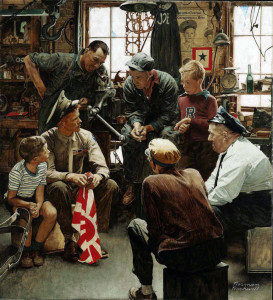Stephen den Beste died this week.
he was an early blogger but has been in poor health recently and stopped blogging the past year.
On Islamist terrorism:
The nations and the peoples within the zone of our enemy’s culture are complete failures. Their economies are disasters. They make no contribution to the advance of science or engineering. They make no contribution to art or culture. They have no important diplomatic power. They are not respected. Most of their people are impoverished and miserable and filled with resentment, and those who are not impoverished are living a lie. They hate us.
They hate us because our culture is everything theirs is not. Our culture is vibrant and fecund; our economies are successful. Our achievements are magnificent. Our engineering and science are advancing at breathtaking speed. Our people are fat and happy (relatively speaking). We are influential, we are powerful, we are wealthy. “We” are the western democracies, but in particular “we” are the United States, which is the most successful of the western democracies by a long margin. America is the most successful nation in the history of the world, economically and technologically and militarily and even culturally.
Sadly, our own culture seems to be under attack from within.
His blog post on Game Theory and The Prisoner’s Dilemma is excellent.
The Prisoner’s Dilemma is a classic of Game Theory
It has been endlessly analyzed but Den Beste’s is about the best I know.
There’s been a lot of analysis of this, and it turns out that honesty isn’t the best policy. One guy decided to run a computer tournament; people were permitted to create algorithms in a synthetic language which would have the ability to keep track of previous exchanges and make a decision on each new exchange whether to be honest or to cheat. He challenged them to see who could come up with the one which did the best in a long series of matches against various opponents. It turned out that the best anyone could find, and the best anyone has ever found, was known as “Tit-for-tat”.
On the first round, it plays fair. On each successive round, it does to the other guy what he did the last time.
When Tit-for-tat plays against itself, it plays fair for the entire game and maximizes output. When it plays against anyone who tosses in some cheating, it punishes it by cheating back and reduces the other guys unfair winnings.
No-one has ever found a way of defeating it.
Now let’s analyze two different and even more simplistic approaches; we’ll call them “saint” and “sinner”. The saint plays fair every single round, irrespective of what the other guy does. The sinner always cheats.
When a saint plays against another saint, or against tit-for-tat, the result is optimum but more important is that everyone gets the same result. When a sinner plays against another sinner, or against tit-for-tat, everyone cheats and the result is still even, though less than optimal.
But when a sinner plays against a saint, the sinner wins and the saint loses.
Which brings me back to the point of all this: Is there anything I would rule out in war? Nothing I’d care to admit to my enemies, because ruling out anything is a “saint” tactic. The Tit-for-tat tactic is to be prepared to do anything, but not to do so spontaneously. In other words, if the other guy threatens to use poison gas, you make sure you have some of your own and let him know that you’ll retaliate with it. That means that he has nothing to win by using it, and he won’t. (A war is a sequence game and not a single transaction because each day is a new exchange. If you gassed my guys yesterday, I can gas yours today.)
Unfortunately, this logic has been abandoned by the Ruling Class, which thinks it is more important to signal its virtue than to defend the country.


